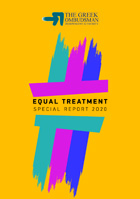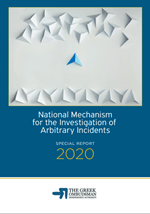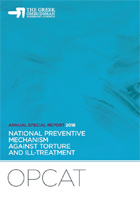How to complain
Every citizen, before resorting to the Ombudsman, should have contacted the public service involved in the case first. Only if such contact has failed to resolve the problem may the citizen file a complaint to the Ombudsman.
The complaint must:
- be made in writing, but not necessarily in the Greek language
- have full identification data and signature
- be from the concerned * or authorised person thereof
- be explicitly addressed to the Ombudsman asking for its intervention (rather than a simple notification)
- contain contact details, i.e. postal address and telephone number
In matters of child rights, the concerned may be:
a. the holder of the parental care of the child
b. a relative of the child
c. the child’s guardian, provisional or definitive
d. a third party who has witnessed or has evidence of breach of the child’s rights
Note: the filing of the complaint does not require consent from both parents, as holders of parental care
The complaint should contain:
- an outline of the problem
- the public service involved
- the actions already carried out
- the outcome of these actions
- any evidence or information that may assist in the investigation of the matter
The complaint is filed:
- in person at the Ombudsman’s building (Monday to Friday, 8:30 to 14:00 and Wednesday until 16:30)
- by post: 17 Halkokondyli St, 104 32 Athens GREECE
- οn line
Complaint form | pdf file |
- How can complaints be submitted?
- Verbal Inquiries
- The Citizen's Reception and Information Bureau
- What should each complaint include?
- What stages does the investigation of the case follow?
How can complaints be submitted?
- in person & in writing
- by post to the above address
- by fax (+30) 213 1306 800 and (+30) 210 729 21 29
- Online complaint
Note: The provisions currently in force do not allow the Greek Ombudsman to accept complaints submitted by e-mail
Verbal Inquiries
In addition to written complaints, every day the office of the Ombudsman is asked a large number of questions verbally concerning specific information through the Citizens' Reception and Information Bureau. These questions may be asked either in person or by telephone.
The Citizen's Reception and Information Bureau
The Citizen's Reception and Information Bureau is staffed by Senior Investigators on a daily rota basis.
The Bureau is open daily (Monday to Friday) from 8:30 a.m. until 2:00 p.m. and on Wednesdays until 4:30 p.m. The purposes of the Bureau are:
- To provide information about how the Ombudsman operates, the progress of citizens' complaints and, whenever possible, to provide information concerning the appropriate agencies to handle cases outside the Ombudsman's mandate.
-
To assist, wherever necessary, in the writing of complaints, so that citizens' requests will be formulated clearly. This helps the Investigators who will handle the complaints and ensures that citizens are promptly served.
Through the above means of communication, the Ombudsman ensures direct, personal, and friendly communication with citizens.
What should each complaint include?
- Full personal details and signature of the complainant
- A brief description of the problem
- the complainant's request
- the public body against which the complaint is made. In cases of violation of a child 's rights or of unequal treatment of men and women in matters of employment, the private individual or company involved
- any actions already taken and their results
- any evidence or information which might assist in the investigation of the complaint (see the complaint form on top of page)
What stages does the investigation of the case follow?
Every complaint submitted:
- receives a reference number and is assigned to an Investigator (stage 1)
- is examined to determine whether it falls within the authority's mandate (stage 2)
- during the investigation of the complaint, the views of all parties involved in the dispute are sought (stage 3)
- the Greek Ombudsman mediates in every appropriate manner to resolve the citizen's problem (stage 4)












